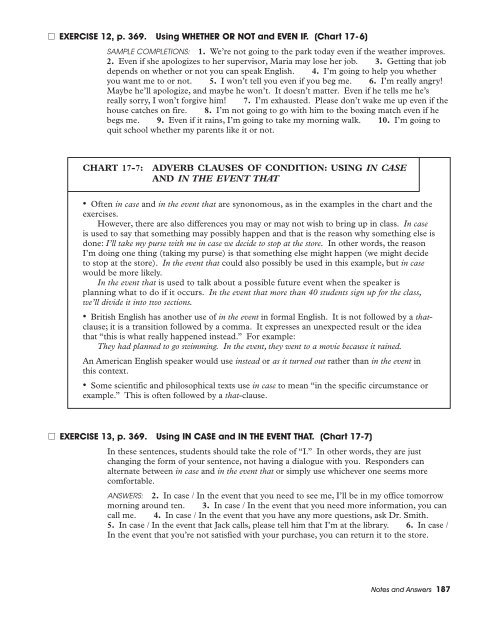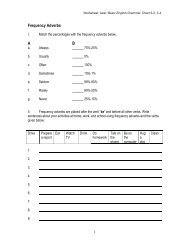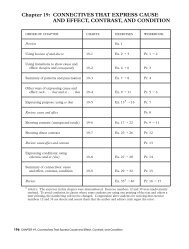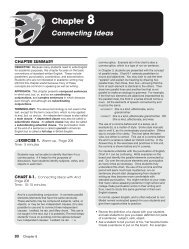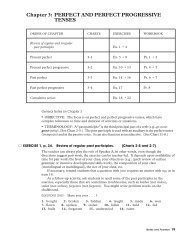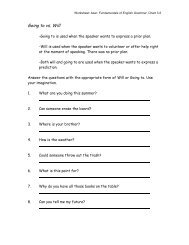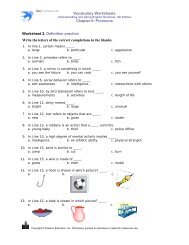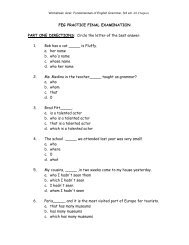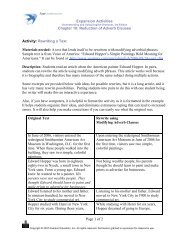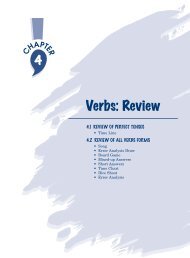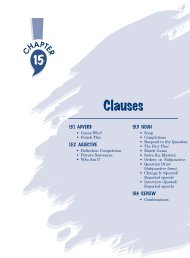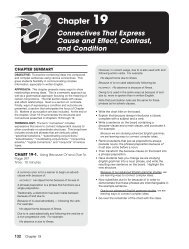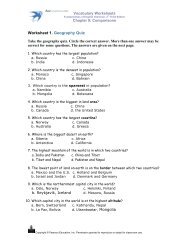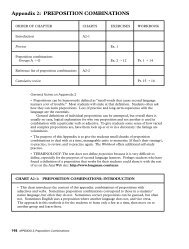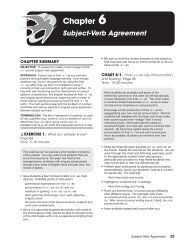Chapter 17: ADVERB CLAUSES - AzarGrammar.com
Chapter 17: ADVERB CLAUSES - AzarGrammar.com
Chapter 17: ADVERB CLAUSES - AzarGrammar.com
You also want an ePaper? Increase the reach of your titles
YUMPU automatically turns print PDFs into web optimized ePapers that Google loves.
EXERCISE 12, p. 369. Using WHETHER OR NOT and EVEN IF. (Chart <strong>17</strong>-6)SAMPLE COMPLETIONS: 1. We’re not going to the park today even if the weather improves.2. Even if she apologizes to her supervisor, Maria may lose her job. 3. Getting that jobdepends on whether or not you can speak English. 4. I’m going to help you whetheryou want me to or not. 5. I won’t tell you even if you beg me. 6. I’m really angry!Maybe he’ll apologize, and maybe he won’t. It doesn’t matter. Even if he tells me he’sreally sorry, I won’t forgive him! 7. I’m exhausted. Please don’t wake me up even if thehouse catches on fire. 8. I’m not going to go with him to the boxing match even if hebegs me. 9. Even if it rains, I’m going to take my morning walk. 10. I’m going toquit school whether my parents like it or not.CHART <strong>17</strong>-7:<strong>ADVERB</strong> <strong>CLAUSES</strong> OF CONDITION: USING IN CASEAND IN THE EVENT THAT• Often in case and in the event that are synonomous, as in the examples in the chart and theexercises.However, there are also differences you may or may not wish to bring up in class. In caseis used to say that something may possibly happen and that is the reason why something else isdone: I’ll take my purse with me in case we decide to stop at the store. In other words, the reasonI’m doing one thing (taking my purse) is that something else might happen (we might decideto stop at the store). In the event that could also possibly be used in this example, but in casewould be more likely.In the event that is used to talk about a possible future event when the speaker isplanning what to do if it occurs. In the event that more than 40 students sign up for the class,we’ll divide it into two sections.• British English has another use of in the event in formal English. It is not followed by a thatclause;it is a transition followed by a <strong>com</strong>ma. It expresses an unexpected result or the ideathat “this is what really happened instead.” For example:They had planned to go swimming. In the event, they went to a movie because it rained.An American English speaker would use instead or as it turned out rather than in the event inthis context.• Some scientific and philosophical texts use in case to mean “in the specific circumstance orexample.” This is often followed by a that-clause. EXERCISE 13, p. 369. Using IN CASE and IN THE EVENT THAT. (Chart <strong>17</strong>-7)In these sentences, students should take the role of “I.” In other words, they are justchanging the form of your sentence, not having a dialogue with you. Responders canalternate between in case and in the event that or simply use whichever one seems more<strong>com</strong>fortable.ANSWERS: 2. In case / In the event that you need to see me, I’ll be in my office tomorrowmorning around ten. 3. In case / In the event that you need more information, you cancall me. 4. In case / In the event that you have any more questions, ask Dr. Smith.5. In case / In the event that Jack calls, please tell him that I’m at the library. 6. In case /In the event that you’re not satisfied with your purchase, you can return it to the store.Notes and Answers 187


